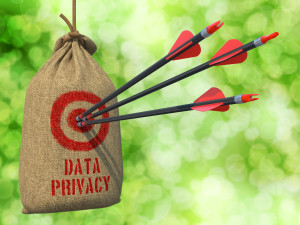Data Privacy: What’s the Big Deal?
For those in the private sector, collecting customer information serves as an incredible tool to not only engage with your customers, but to also cater to their needs. The amount of information that prospects are willing to give you also allows you to gauge their interest in your services.
However, while your website may be a primary source where clients and prospects share their information, many are questioning the actual use of this information.
Is it really being used to just send company emails or could their personal information end up in the hands of a third-party? Data privacy is a growing concern for those on the receiving end of businesses who make use of big data tools. While collecting data is ultimately voluntary for prospects and consumers, where it goes after it is given is the main concern. And who should be in charge of maintaining the order?
It’s clear that businesses shouldn’t be the ones in charge of maintaining the ethical order as the conflict of interest is clear — which means the responsibility can only be left in the hands of our government.
Data Privacy & The Government
When Edward Snowden revealed the telecommunication spying efforts done by the NSA on millions of American Verizon customers, it sparked the conversation surrounding the question of how secure is our information really?
Both the White House and the Federal Trade Commission have addressed the topics and are striving to make more stringent policies in protecting big data, but the topic still remains unsettled. But perhaps it shouldn’t be unexpected that the issue is ongoing. It’s especially difficult to monitor big data privacy concerns when the entity that is supposed to establish and maintain judicial law is overstepping its boundaries by wiretapping its own citizens.
Areas of Improvement
When you download a new application for your phone or new program for your desktop, you’ll likely have a Terms & Conditions page that requires your approval in order for you to use the new software. Companies often use heavy-loaded jargon to discourage users from reading the script entirely and it’s here where their attempt to be transparent smoothly slips the mind of the user.
As a business who is likely collecting big data, it’s advised to be as transparent as possible — without the lengthy distractions. Keeping your customers and prospects in the loop of where their personal information is going is key to building a solid relationship as the question will likely come up if your customers are aware of the growing concern of data privacy.
Data Brokers
The companies that purchase consumer information and analyze their purchasing behavior are known as data brokers. Once they’ve collected this information, they sell what they’ve gathered to companies who are looking to maximize their marketing.
While the consumer may or may not have signed off on this use of their data, their information is still out there being used.
Steps to Tighten Up Your Data Security
Make sure your cloud technology is up to par. This should be one of your first steps in protecting your most important big data.
As these cloud storage initiatives are affordable and flexible, it serves as the perfect medium to house your customer/prospect information. While great, it still has its limitations.

concept of big data processing and storage: users, devices and file transfers
Keeping your information safe from intruders is necessary as the information is likely stored in a public server, where it’s easier for intruders to infiltrate. Moving to a public cloud source gives you an extra layer of security where data is kept safe and visible to only you and whoever you assign responsibility to.
Another measure one could take is to sanitize your data. According to a data warehouse specialist from Emory University, Amy Dean says, “apply filtering, cleansing, pruning, conforming, matching, joining and diagnosing at the earliest touch points possible.” This relates more to the analytics portion of data storage and helps to ensure the quality of information that you’ve collected is correct and up to date.
Lastly, the most transparent way to ensure the ultimate data privacy is to allow your clients and even prospects to view the data you collected about them. Allow them to change information as they see fit — without making it a costly or difficult process. While this may seem unlikely for any company to do, in terms of transparency, it is the most fair.

